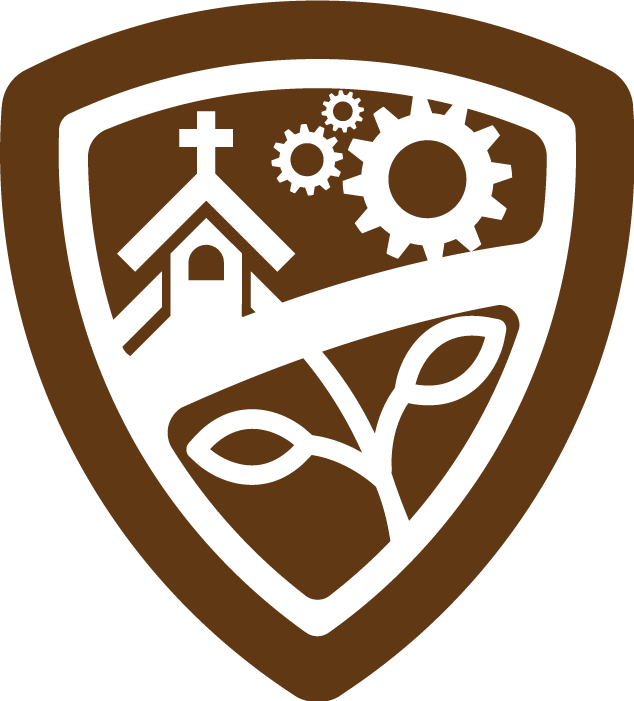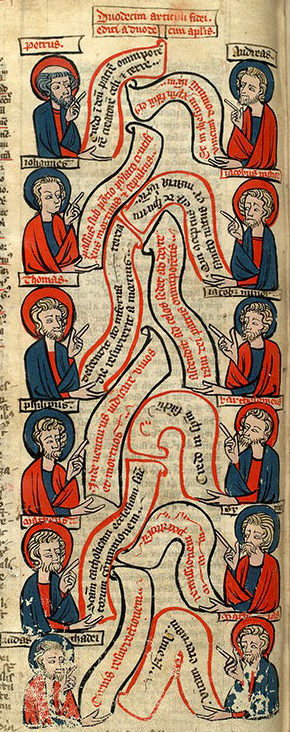Who is in the great cloud of witnesses?
12 Articles of Faith was written down in 390. The above art dates from the 13th-century.
Well, here's a guide. The Apostles’ Creed is one of a few early creeds that sought to put down the Christian theology (the study of God) in a few words. The origin of the creed is very early in Christian history and based in the Gospels.
I believe in God the Father Almighty,
Maker of heaven and earth:
And in Jesus Christ his only Son our Lord,
Who was conceived by the Holy Ghost,
Born of the Virgin Mary,
Suffered under Pontius Pilate,
Was crucified, dead, and buried:
He descended into hell;
The third day he rose again from the dead;
He ascended into heaven,
And sits on the right hand of God the Father Almighty;
From thence he shall come to judge the quick and the dead.
I believe in the Holy Ghost;
The holy Catholic Church;
The Communion of Saints;
The Forgiveness of sins;
The Resurrection of the body,
And the Life everlasting.
Amen.
What's in a denomination?
Actually, a lot. It represents a community of believers and a structure that is either more or less authoritative, more or less rooted in history and practice. There are dangers whether you are rooted in like the Orthodox, for example, or as new to the life on this tree as the congregational, non-denominational churches. The most important is to secure yourself to Jesus, his death and bodily resurrection, the Author and Finisher of our faith.
First Century • The one catholic church begins as the Apostles share Jesus’ message. There will be natural separations of the churches based in the various parts of the Roman Empire: the Coptic Church in Alexandria, Egypt, the Roman Catholic Church in Rome, Italy, and the Eastern Orthodox Church in Constantinople (in modern day Turkey, now known as Istanbul).
325 • The Council of Nicaea secures the truth away from questions raised by Arius
431 • The Council of Ephesus combats Nestorianism, Theotokos, and Pelagianism
451 • The Council of Chalcedon affirms the divinity and humanity of Christ
506 • Armenian Church is formed
1054 • The Great Schism, the break between Western and Eastern Christianity
1457 • Hussites (also called Moravians) form through the martyrdom of Jan Hus
1517 • The Reformation that would yield many denominations, including Lutheranism
1524 • Hutterites begin with Jokob Hutter, part of the Anabaptist movement
1534 • Anglicanism, with the help of Thomas Cranmer
1560 • Presbyterianism, with the theology of John Calvin and John Knox
1609 • The Baptist movement begins with John Smyth in England
1632 • The Mennonite movement, an Anabaptist separatist denomination begins
1638 • The American Baptist church begins
1648 • The root of today’s Congregational church with the writing of the Cambridge Platform
1650 • Quakerism is formed through the leadership of George Fox
1708 • The Brethren Church is formed, first in Germany and then the US in 1723
1784 • Methodism, began by John and Charles Wesley, as well as George Whitefield
1787 • The African Methodist Episcopal Church is founded by Richard Allen
1845 • The Southern Baptist Convention begins in Augusta, Georgia
1863 • The Seventh-Day Adventist Church begins with their emphasis on Saturday services
1900 • The Pentecostal movement grows with Charles Parham and William Seymour
1914 • Assemblies of God is founded
Today, the non-denominational church that may go by titles that include community or more innovative inclusions like mosaic, life, crossroads, vintage, and the like, all stem from a denominational movement above. Disguising their history is peculiar and too early a development to critique. However, the hustle and bustle of modernity, the sliding definitions of neighborhood and neighbor, and the growing illiteracy of historical references are certainly contributors.



